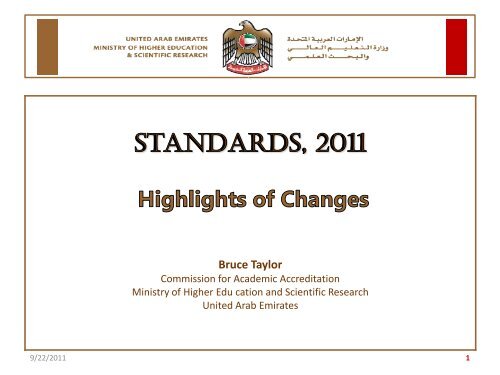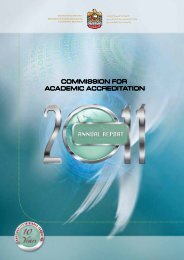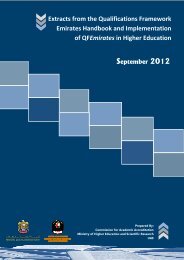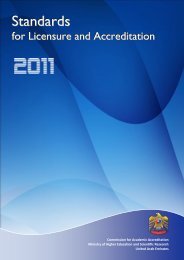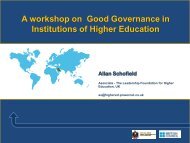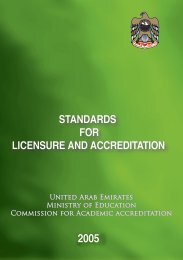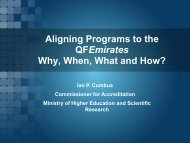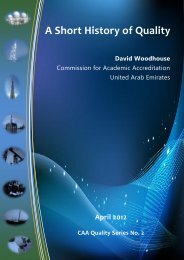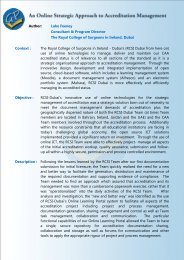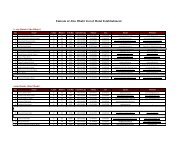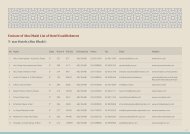to download the PowerPoint Presentation - CAA
to download the PowerPoint Presentation - CAA
to download the PowerPoint Presentation - CAA
You also want an ePaper? Increase the reach of your titles
YUMPU automatically turns print PDFs into web optimized ePapers that Google loves.
Bruce Taylor<br />
Commission for Academic Accreditation<br />
Ministry of Higher Edu cation and Scientific Research<br />
United Arab Emirates<br />
9/22/2011<br />
1
Key Principles<br />
• Evolutionary ra<strong>the</strong>r than revolutionary change<br />
• Organization is more systematic – easier for<br />
institutions <strong>to</strong> understand what is expected of<br />
<strong>the</strong>m<br />
• New substantive content, and addition or<br />
relaxation of requirements, is based on <strong>the</strong><br />
Commission’s recent experience with licensure<br />
and accreditation<br />
9/22/2011<br />
2
Discussed in o<strong>the</strong>r<br />
presentations<br />
• Procedural Guidelines that assist institutions in<br />
preparing for Commission reviews<br />
• New Standard 11 on Community Engagement<br />
• Integration of Standards with UAE Qualifications<br />
Framework<br />
9/22/2011<br />
3
Stipulations<br />
• Stipulations provide greater detail as <strong>to</strong> what is<br />
expected of institutions <strong>to</strong> comply with <strong>the</strong><br />
relevant Standard<br />
• References <strong>to</strong> Stipulations are included in <strong>the</strong><br />
text of <strong>the</strong> Standards <strong>to</strong> which <strong>the</strong>y apply<br />
• Stipulations carry <strong>the</strong> weight of <strong>the</strong> Standards<br />
and must be adhered <strong>to</strong> by licensed institutions<br />
9/22/2011<br />
4
Source of Stipulations<br />
• Appendix A (Required Documents) of 2007 Standards,<br />
in particular Part I (Policies and Procedures Manual)<br />
• O<strong>the</strong>r Appendices of 2007 Standards (Substantive<br />
Change, Guidelines for Good Practice in Practicums or<br />
Internships)<br />
• 2010 Guidance Note on Graduate Admissions<br />
• New content: Stipulation 7 (Course Files);<br />
Stipulation 9 (Adjunct Clinical Faculty)<br />
9/22/2011<br />
5
Reorganization of text<br />
• Standards 1 and 2: Mission, Organization and Governance<br />
now brought <strong>to</strong>ge<strong>the</strong>r in Standard 1, while Standard 2<br />
focuses specifically on quality assurance and institutional<br />
research<br />
• Standards 6 and 7: Learning resources including information<br />
(library), technology, and labora<strong>to</strong>ry resources brought<br />
<strong>to</strong>ge<strong>the</strong>r in Standard 6, while Standard 7 discusses physical<br />
environment<br />
• Risk management included as an element of Standard 2<br />
(formerly in Standard 8); advising services included in<br />
Standard 5 (formerly in Standard 3)<br />
9/22/2011<br />
6
Standard 1.1<br />
Vision Statement<br />
In addition <strong>to</strong> a mission statement, Standard<br />
1.1 requires a vision statement that defines<br />
<strong>the</strong> institution’s aspirations for <strong>the</strong> long term<br />
9/22/2011<br />
7
Standard 1.4<br />
<br />
Institutional Governance<br />
• Standard clarifies <strong>the</strong> Commission’s expectation<br />
that owners or inves<strong>to</strong>rs in an institution do not<br />
hold an executive position<br />
• This re-emphasizes a requirement that <strong>the</strong><br />
Commission has been strictly enforcing in 2011<br />
9/22/2011<br />
8
Standard 1.6<br />
Multiple Campus Institutions<br />
A manual is required documenting how activities are<br />
coordinated across campuses by institutions with<br />
more than one campus<br />
9/22/2011<br />
9
Standards 1.7 and 1.8<br />
Branch Campuses<br />
• Standard 1.7 governs UAE institutions’ branch campuses in<br />
foreign countries<br />
• Standard 1.8 governs foreign institutions’ branch campuses in<br />
UAE<br />
• Key requirements under Standard 1.8:<br />
• Comparability of learning outcomes with those of programs<br />
at parent institution<br />
• Local advisory board and locally-based administra<strong>to</strong>rs<br />
• Localized Catalog and o<strong>the</strong>r documents<br />
• Teach-out plan in case branch campus closes or programs<br />
are discontinued<br />
9/22/2011<br />
10
Standard 2.4<br />
Continuous Quality Enhancement<br />
• Explicit requirement that findings of institutional<br />
research are used <strong>to</strong> improve programs and<br />
services, or enhance resources (“closing <strong>the</strong><br />
loop”)<br />
• Requirement that institutions benchmark <strong>the</strong>ir<br />
activities against best local and international<br />
practices<br />
9/22/2011<br />
11
Standard 2.6<br />
Annual report of QA activities<br />
An annual report <strong>to</strong> <strong>the</strong> <strong>CAA</strong> is required on <strong>the</strong> activities<br />
and achievements of <strong>the</strong> quality assurance/institutional<br />
effectiveness unit over <strong>the</strong> preceding year<br />
9/22/2011<br />
12
Standard 3.4<br />
General Education<br />
• Text of Standard 3.4 indicates that <strong>the</strong> purpose of General<br />
Education is <strong>to</strong> add breadth <strong>to</strong> undergraduate students’<br />
intellectual experience<br />
• General Education requirement includes five content areas<br />
(languages, humanities/arts, natural sciences, information<br />
technology/ma<strong>the</strong>matics, social/behavioral sciences)<br />
• Information literacy requirement now subsumed under<br />
General Education<br />
9/22/2011<br />
13
Standard 3.8<br />
Course Delivery<br />
• Requires institutions <strong>to</strong> demonstrate that course<br />
syllabi are followed in actual practice<br />
• Requires institutions <strong>to</strong> ensure <strong>the</strong> appropriateness<br />
of <strong>the</strong>ir assessment practices<br />
• Requires course files <strong>to</strong> be maintained which<br />
provide evidence that courses are meeting <strong>the</strong>ir<br />
learning outcomes (details in Stipulation 7)<br />
9/22/2011<br />
14
Standard 3.9<br />
Class size<br />
• Requires institution <strong>to</strong> develop guidelines on<br />
appropriate class size, consistent with<br />
effective pedagogy<br />
• Does not mandate class sizes<br />
9/22/2011<br />
15
Standard 4.4<br />
Faculty Preparation<br />
Text of this Standard makes explicit <strong>the</strong> Commission’s<br />
expectation that an institution should have faculty and<br />
administration with diverse cultural and educational<br />
backgrounds<br />
9/22/2011<br />
16
Standard 4.9<br />
Faculty Workload<br />
• Text of this Standard includes requirements for<br />
maximum faculty workloads previously found in<br />
Appendix A of <strong>the</strong> 2007 Standards<br />
• Requires specifically that any necessary overloads be<br />
compensated<br />
• Notes that different types of pedagogy (e.g.,<br />
labora<strong>to</strong>ry or studio classes) must be differently<br />
accounted for in workload calculation<br />
9/22/2011<br />
17
Standard 4.10<br />
Part-time Faculty<br />
• Brings <strong>to</strong>ge<strong>the</strong>r requirements concerning parttime<br />
faculty that were previously subsumed in<br />
o<strong>the</strong>r sections of <strong>the</strong> Standards<br />
• Requires institutions <strong>to</strong> offer services and support<br />
<strong>to</strong> part-time faculty and include <strong>the</strong>m in program<br />
development and similar functions<br />
9/22/2011<br />
18
Standards 5.2, 5.3, and 5.4<br />
Admission Requirements<br />
• Detailed requirements for undergraduate<br />
admission (5.2), graduate admission (5.3), and<br />
transfer admission (5.4) are moved here from<br />
Appendix A of <strong>the</strong> 2007 Standards<br />
• Transfer students must demonstrate <strong>the</strong> required<br />
English language test scores for full admission –<br />
provisional admission is not permitted<br />
9/22/2011<br />
19
Standard 5.5<br />
<br />
Advanced Standing<br />
The award of credit by advanced standing is<br />
permitted provided that <strong>the</strong> Commission approves<br />
<strong>the</strong> institution’s policy specifying <strong>the</strong> conditions<br />
under which such credit is awarded<br />
9/22/2011<br />
20
Standard 5.6<br />
Recognition of Prior Learning<br />
• RPL was in essence not permitted under previous<br />
Standards (Section 9.4 on Enrollment Practices and<br />
Section 3.11 on Continuing Education)<br />
• 2011 Standards allow an institution <strong>to</strong> award credit<br />
for prior learning, including experiential learning,<br />
provided that a institutional policy is approved by<br />
<strong>the</strong> Commission<br />
9/22/2011<br />
21
Standard 5.9<br />
Advising Services<br />
• Moved <strong>to</strong> this Standard from Standard 3<br />
• Institutions are required <strong>to</strong> offer assistance and<br />
support <strong>to</strong> students whose academic performance<br />
is poor<br />
9/22/2011<br />
22
Standard 9.2<br />
Publications<br />
• An institution’s Web site must be kept up-<strong>to</strong>-date<br />
• Policies regarding tuition and fees, and <strong>the</strong><br />
conditions under which <strong>the</strong>y may be changed, must<br />
be transparent<br />
• The Standard reinforces <strong>the</strong> Commission’s view that<br />
<strong>the</strong> Catalog is a contract between <strong>the</strong> institution<br />
and <strong>the</strong> student<br />
9/22/2011<br />
23
Standard 9.3<br />
<br />
Institutional Name<br />
Use of <strong>the</strong> term “University” in an institution’s name is<br />
restricted <strong>to</strong> larger and more diverse institutions<br />
9/22/2011<br />
24
Standard 10<br />
<br />
Research and Scholarly Activities<br />
Name of <strong>the</strong> Standard changed from “Research” <strong>to</strong><br />
reflect broader range of expectations of faculty for<br />
contribution <strong>to</strong> scholarship<br />
9/22/2011<br />
25
Stipulation 1A<br />
<br />
Teach-Out Policy<br />
Text of Stipulation 1A, point 9 explicitly requires a<br />
Teach-Out Policy in <strong>the</strong> institution’s Policies and<br />
Procedures Manual<br />
Teach-Out Policy governs <strong>the</strong> arrangements for<br />
students <strong>to</strong> fur<strong>the</strong>r <strong>the</strong>ir education in case an<br />
institution is closed or a program discontinued<br />
9/22/2011<br />
26
Stipulation 2<br />
Substantive Change procedures<br />
Text of <strong>the</strong> Standards makes several references <strong>to</strong><br />
actions that are considered Substantive Change (e.g.,<br />
establishing a local or foreign branch campus, making<br />
changes <strong>to</strong> programs that significantly modify goals or<br />
learning outcomes, offering a program using a mode<br />
of delivery not used before)<br />
Stipulation gives examples of actions that do not<br />
require notification as Substantive Change<br />
9/22/2011<br />
27
Stipulation 7<br />
Course Files<br />
• Course files must contain sufficient information<br />
about <strong>the</strong> presentation of a course so that faculty<br />
and o<strong>the</strong>r reviewers can determine whe<strong>the</strong>r<br />
learning outcomes are met, and what changes if<br />
any are appropriate <strong>to</strong> <strong>the</strong> course<br />
• Contents of course files inform institution’s own<br />
program effectiveness processes, as well as <strong>CAA</strong><br />
External Review Teams<br />
9/22/2011<br />
28
Stipulation 9<br />
Adjunct Clinical Faculty<br />
Stipulation specifies <strong>the</strong> levels of education,<br />
academic experience, and clinical experience<br />
required for appointment of Adjunct Clinical Faculty<br />
at different ranks<br />
9/22/2011<br />
29
Stipulation 10<br />
Graduate Admission<br />
Stipulation incorporates in<strong>to</strong> <strong>the</strong> Standards <strong>the</strong><br />
requirements for graduate admission communicated<br />
by letter <strong>to</strong> institutions in May, 2010<br />
Stipulation liberalizes previous requirements for<br />
conditional admission and eliminates need for<br />
previous “Mature Admission” category<br />
9/22/2011<br />
30
Appendix 1<br />
Courses offered in condensed periods<br />
A new Appendix setting out <strong>the</strong> Commission’s<br />
expectation that courses offered in condensed<br />
periods will follow acceptable practices in teaching<br />
and assessment, and are comparable in terms of<br />
learning outcomes <strong>to</strong> courses offered during a<br />
regular semester/term<br />
9/22/2011<br />
31
Appendix 2<br />
Glossary Entries<br />
• “Joint” and “Dual” qualifications are defined and<br />
differentiated.<br />
• Examples of <strong>the</strong> definition of “credit” under<br />
different national systems are provided<br />
• The terms “major” and “concentration” are<br />
explained<br />
9/22/2011<br />
32
Timetable for implementation<br />
• Submissions for institutional licensure or program<br />
accreditation reaching <strong>the</strong> Commission before 1<br />
November 2011 may be reviewed under ei<strong>the</strong>r <strong>the</strong><br />
2007 Standards or <strong>the</strong> 2011 Standards<br />
• All submissions reaching <strong>the</strong> Commission after 1<br />
November 2011 will be reviewed under <strong>the</strong> 2011<br />
Standards<br />
https://www.caa.ae/caa/images/Standards2011.pdf<br />
9/22/2011<br />
33
Ian P. Cumbus<br />
Commission for Academic Accreditation<br />
Ministry of Higher Education and Scientific Research<br />
United Arab Emirates<br />
9/22/2011<br />
34
Community Engagement<br />
<br />
Section 11 - A new section in <strong>the</strong> 2011 Standards for<br />
Licensure and Accreditation.<br />
WHY?<br />
Recognition that institutions have an important, interactive<br />
role <strong>to</strong> play within <strong>the</strong>ir constituency.<br />
Need <strong>to</strong> focus <strong>the</strong> engagement on areas that serve <strong>the</strong><br />
institutional mission and vision.<br />
Significant aspects of engagement will utilize institutional<br />
resources.<br />
Community Engagement has been embraced in many o<strong>the</strong>r QA<br />
Standards around <strong>the</strong> world.<br />
9/22/2011<br />
35
Community Engagement<br />
Three key points from <strong>the</strong> introduction <strong>to</strong> this <strong>to</strong>pic in<br />
our Standards are as follows:<br />
This community engagement is mutually beneficial <strong>to</strong> both<br />
institutions and <strong>the</strong> communities <strong>the</strong>y serve.<br />
… resources that can be deployed <strong>to</strong> bring benefits beyond <strong>the</strong><br />
classroom, and in so doing enhance <strong>the</strong> reputation of <strong>the</strong><br />
institution and contribute <strong>to</strong> its development.<br />
… <strong>the</strong> community is considered as a main stakeholder in <strong>the</strong><br />
continuous development of <strong>the</strong> institution’s programs and<br />
services.<br />
9/22/2011<br />
36
Community Engagement<br />
Institutions bring a wealth of new resources <strong>to</strong> <strong>the</strong>ir local city,<br />
Emirate and/or <strong>the</strong> UAE:<br />
• A range of high level expertise, often across a wide range of<br />
disciplines<br />
• Useful physical facilities and equipment, often not used <strong>to</strong> complete<br />
capacity<br />
• Collections of learning resources – library and o<strong>the</strong>r materials in<br />
relation <strong>to</strong> specific disciplines<br />
• A pool of students <strong>to</strong> feed <strong>the</strong> employment opportunities locally or<br />
shorter-term projects and activities.<br />
9/22/2011<br />
37
9/22/2011<br />
38
UAE Qualifications Framework<br />
Extracts from <strong>the</strong> draft UAEQF Handbook<br />
“The National Qualifications Authority has overall responsibility for<br />
setting policy, managing and assuring <strong>the</strong> quality and integrity of <strong>the</strong><br />
qualifications system implemented under its auspices”<br />
“The accreditation bodies are responsible for approval of<br />
qualifications, standards, and quality assurance”<br />
The accreditation bodies are:<br />
• The Commission for Academic Accreditation (<strong>CAA</strong>)<br />
• The General Education Commission for Secondary Education<br />
(GEC), and<br />
• The Vocational Education and Training Awards Commission<br />
(VETAC)<br />
9/22/2011<br />
39
The National Qualifications<br />
Authority NQA<br />
<br />
The National Qualifications Authority (NQA) was<br />
established by issuance of a Decree:<br />
Title:<br />
Establish and Maintain <strong>the</strong> NQA<br />
Date of decree: 23 August 2010<br />
Management:<br />
Reports <strong>to</strong>:<br />
Board of Trustees<br />
Council of Ministers (Cabinet)<br />
9/22/2011<br />
40
Strategic Policy<br />
Operational<br />
Functions and Commissions coordination<br />
NQA Board<br />
National Qualifications<br />
Authority (NQA)<br />
MOHESR<br />
MoE<br />
O<strong>the</strong>rs<br />
QUALITY AND<br />
PERFORMANCE<br />
QUALIFICATIONS<br />
REGISTER & INFO<br />
SYSTEM (QRIS)<br />
ACCREDITATION &<br />
AWARDS<br />
COMMISSIONS<br />
QUALIFICATIONS<br />
FRAMEWORK<br />
Delegated responsibility<br />
Commission for Academic<br />
Accreditation<br />
(<strong>CAA</strong>)<br />
New entity<br />
Vocational Education and<br />
Training Awards Commission<br />
(VETAC)<br />
Delegated responsibility<br />
General Education<br />
Commission<br />
(GEC)<br />
9/22/2011<br />
Existing body<br />
New establishment<br />
41
Proposed Qualifications<br />
Framework for <strong>the</strong> UAE<br />
An integrated framework for <strong>the</strong> development of<br />
qualifications in <strong>the</strong> United Arab Emirates<br />
Commission for Academic Accreditation (<strong>CAA</strong>)<br />
and<br />
National Qualifications Authority (NQA)<br />
March 2011<br />
9/22/2011<br />
42
Rationale for a Qualifications<br />
Framework<br />
• To provide a frame of reference, enabling all qualifications<br />
<strong>to</strong> be described and compared<br />
• To assist in defining <strong>the</strong> learning outcomes required for new<br />
qualifications<br />
• Provide a basis for comparison of UAE qualifications with<br />
o<strong>the</strong>r national or international qualifications<br />
• To facilitate <strong>the</strong> recognition of <strong>the</strong> learning achievements of<br />
students<br />
• Helps learners <strong>to</strong> make informed decisions about fur<strong>the</strong>r<br />
education and career progression<br />
• To facilitate life-long learning<br />
9/22/2011<br />
43
UAE Qualifications Framework Proposal<br />
1. ten (10) levels are proposed.<br />
2. learning outcomes are expressed in terms of:<br />
– knowledge<br />
– skill<br />
– aspects of competence (comprising three [3] sub-parts)<br />
• That is, five (5) ‘strands’, which are:<br />
Strand 1 Strand 2 Strand 3 Strand 4 Strand 5<br />
Knowledge<br />
Skill<br />
Au<strong>to</strong>nomy &<br />
Responsibility<br />
Selfdevelopment<br />
Role in<br />
context<br />
9/22/2011<br />
Aspects of competence 44
Grid of Level Descrip<strong>to</strong>rs<br />
Level Knowledge (Version 01022141) Skill Au<strong>to</strong>nomy and responsibility Self-development Role in context<br />
10<br />
comprehensive, deep and overarching knowledge at <strong>the</strong><br />
frontier of a field of work or learning and at <strong>the</strong> interface<br />
between different fields<br />
new knowledge, as judged by independent experts applying<br />
international standards, created through research or<br />
scholarship, that contributes <strong>to</strong> <strong>the</strong> development of a field of<br />
work or learning<br />
a range of advanced and specialised skills and techniques, including<br />
syn<strong>the</strong>sis, evaluation and reflection, required <strong>to</strong> extend and redefine<br />
existing knowledge or professional practice or <strong>to</strong> produce new and original<br />
knowledge<br />
advanced skills in developing innovative solutions <strong>to</strong> critical problems in<br />
research using highly developed cognitive and creative expert skills and<br />
intellectual independence <strong>to</strong> <strong>the</strong> field of work or learning<br />
highly developed expert communication and technology skills <strong>to</strong> present,<br />
explain and/or critique highly complex and diverse matters<br />
can act with substantial authority, creativity, au<strong>to</strong>nomy,<br />
independence, scholarly and professional integrity in a<br />
sustained commitment <strong>to</strong> <strong>the</strong> development of new ideas or<br />
processes or systems in challenging and novel work or study<br />
contexts<br />
can account for overall governance of processes and systems<br />
can lead action <strong>to</strong> build and transform socio-cultural norms<br />
and relationships<br />
can analyse and critique <strong>the</strong> state of learning in<br />
a field and contribute <strong>to</strong> its advancement<br />
can originate and manage complex professional<br />
processes<br />
can lead and take full responsibility for <strong>the</strong><br />
development and strategic deployment of<br />
professional teams and self<br />
9<br />
comprehensive, highly specialised knowledge in a field of work<br />
or learning and at <strong>the</strong> interface between different fields,<br />
including frontier concepts; including advanced knowledge of<br />
applicable research principles and methods<br />
critical awareness of knowledge issues, as <strong>the</strong> basis for original<br />
thinking; encompassing appropriate processes of enquiry and<br />
current processes of knowledge production<br />
detailed body of knowledge of recent developments in a field<br />
of learning or work and/or professional practice<br />
specialised skills required in research, analysis, evaluation and/or innovation<br />
of complex ideas, information, concepts and/or activities<br />
advanced problem-solving skills required <strong>to</strong> develop new knowledge and<br />
procedures and <strong>to</strong> integrate knowledge from different fields using highly<br />
developed cognitive and creative skills and intellectual independence <strong>to</strong> <strong>the</strong><br />
field of work or learning<br />
highly developed specialist communication and technology skills <strong>to</strong> present,<br />
explain and/or critique highly complex matters<br />
can take responsibility for managing professional practice or<br />
work, processes or systems, or learning contexts that are<br />
complex, unpredictable and require new strategic approaches<br />
and/or intervention or conceptual abstract solutions<br />
can account for high level governance of processes and<br />
systems<br />
can analyse and reflect on socio-cultural norms and<br />
relationships and act <strong>to</strong> build and transform <strong>the</strong>m<br />
can self-evaluate and take responsibility for<br />
contributing <strong>to</strong> professional knowledge and<br />
practice, as well as implementing ethical<br />
standards and fur<strong>the</strong>r learning<br />
can initiate and manage professional activity<br />
can take responsibility for leading <strong>the</strong> strategic<br />
performance and development of professional<br />
teams and self<br />
8<br />
advanced or specialised knowledge and critical understanding<br />
in a specialised field of work or learning and at <strong>the</strong> interface<br />
between fields<br />
critical approach <strong>to</strong> a systematic and coherent body of<br />
knowledge and concepts gained from a range of sources<br />
problem-solving skills applied <strong>to</strong> a specialist field and <strong>the</strong> integration of<br />
knowledge from different fields of work or learning <strong>to</strong> solve complex<br />
unpredictable and/or abstract problems with intellectual independence<br />
critical selection of appropriate research <strong>to</strong>ols and strategies associated with<br />
<strong>the</strong> discipline field of work or learning<br />
highly developed advanced communication and technology skills <strong>to</strong> present,<br />
explain and/or critique substantively complex matters<br />
can take responsibility for developing and implementing new<br />
or creative approaches <strong>to</strong> managing complex work processes<br />
and organisation, resources or learning, including leading and<br />
managing teams within a technical or professional activity<br />
can work effectively as an individual or in team leadership<br />
contexts<br />
can express a comprehensive, internalised, personal world<br />
view, while accepting responsibility <strong>to</strong> society at large and <strong>to</strong><br />
socio-cultural norms and relationships<br />
can self-evaluate and take responsibility for<br />
contributing <strong>to</strong> professional practice and<br />
fur<strong>the</strong>r learning, in complex and sometimes<br />
unfamiliar learning contexts<br />
can lead, contribute and observe ethical<br />
standards<br />
can manage professional activity<br />
can take responsibility for leading <strong>the</strong> strategic<br />
performance of professional teams and self<br />
can coordinate peer relationships with qualified<br />
practitioners and lead multiple, complex groups<br />
7<br />
specialised factual and <strong>the</strong>oretical knowledge and an<br />
understanding of <strong>the</strong> boundaries in a field of work or learning,<br />
encompassing a broad and coherent body of knowledge and<br />
concepts, with substantive depth in <strong>the</strong> underlying principles<br />
and <strong>the</strong>oretical concepts<br />
familiarity with sources of new research and knowledge with<br />
integration of concepts from outside fields<br />
technical, creative and analytical skills appropriate <strong>to</strong> solving specialised<br />
problems using evidentiary and procedural based processes <strong>to</strong> predictable<br />
and new contexts associated with a field of work or learning, encompassing<br />
evaluating, selecting and applying appropriate methods, procedures or<br />
techniques in processes of investigation <strong>to</strong> identified solutions<br />
selection of appropriate research <strong>to</strong>ols and strategies associated with <strong>the</strong><br />
field of work or learning<br />
highly developed advanced communication and technology skills <strong>to</strong> present,<br />
explain and/or critique complex matters<br />
can take responsibility for developing new and advanced<br />
approaches <strong>to</strong> managing or evaluating complex and<br />
unpredictable work procedures and processes, resources or<br />
learning, including leading teams within a technical or<br />
professional activity<br />
can manage technical, supervisory or design processes in<br />
unpredictable contexts<br />
can work creatively and/or efficiently as an individual or in<br />
team leadership or managing contexts<br />
can express an internalised, personal view, and accept<br />
responsibility <strong>to</strong> society at large and <strong>to</strong> socio-cultural norms<br />
and relationships<br />
can self-evaluate and take responsibility for<br />
contributing <strong>to</strong> professional practice and<br />
fur<strong>the</strong>r learning<br />
can manage learning tasks independently and<br />
professionally, in complex and sometimes<br />
unfamiliar learning context<br />
can take initiative <strong>to</strong> address learning needs<br />
and function independently within learning<br />
groups<br />
can contribute and observe ethical standards<br />
can function with full au<strong>to</strong>nomy in technical and<br />
supervisory contexts and adopt professional roles<br />
with little guidance<br />
can take responsibility for <strong>the</strong> setting and<br />
achievement of group or individual outcomes and<br />
for <strong>the</strong> management and supervision of <strong>the</strong> work of<br />
o<strong>the</strong>rs or self in <strong>the</strong> case of a specialisation in field<br />
of work or learning<br />
can take responsibility for managing <strong>the</strong><br />
professional development of individuals and groups<br />
can participate in peer relationships with qualified<br />
practitioners and lead multiple, complex groups<br />
6<br />
comprehensive, specialised factual knowledge and an<br />
understanding of <strong>the</strong> boundaries in a field of work or learning,<br />
encompassing a broad and coherent body of knowledge and<br />
concepts, with depth in <strong>the</strong> underlying understanding of <strong>the</strong><br />
principles and concepts<br />
familiarity with sources of existing knowledge and <strong>the</strong><br />
integration of concepts from outside fields<br />
specialist technical, creative and conceptual skills appropriate <strong>to</strong> solving<br />
complex problems associated with a field of work or learning<br />
a comprehensive range of specialist cognitive and practical skills appropriate<br />
<strong>to</strong> planning and implementing solutions <strong>to</strong> varied, unpredictable and<br />
unfamiliar problems within a field<br />
identification and use of appropriate research <strong>to</strong>ols and strategies<br />
associated with <strong>the</strong> field of work or learning<br />
advanced communication and technology skills <strong>to</strong> present, explain and/or<br />
critique complex matters<br />
can take responsibility for developing appropriate approaches<br />
<strong>to</strong> managing complex work procedures and processes,<br />
resources or learning, including leading teams within a<br />
technical or professional activity<br />
can manage technical, supervisory or design processes in<br />
varied, unpredictable and unfamiliar contexts<br />
can work effectively as a specialist role or in team leadership<br />
contexts<br />
can express an internalised, personal world view, reflecting<br />
engagement in society at large and in socio-cultural<br />
relationships<br />
can take initiative <strong>to</strong> address learning needs<br />
and function independently within learning<br />
groups<br />
can support and observe ethical standards<br />
can evaluate own learning and identify learning<br />
needs in a familiar and unfamiliar environment<br />
can function with full au<strong>to</strong>nomy in technical and<br />
supervisory contexts and adopt professional roles<br />
under guidance<br />
can take responsibility for <strong>the</strong> setting and<br />
achievement of group outcomes and for <strong>the</strong><br />
supervision of <strong>the</strong> work of o<strong>the</strong>rs<br />
can take responsibility for managing <strong>the</strong><br />
development of individuals and groups<br />
can participate in peer relationships with qualified<br />
practitioners and lead multiple groups<br />
5<br />
comprehensive, specialised knowledge within a broad field of<br />
work or learning, including an understanding of <strong>the</strong> underlying<br />
<strong>the</strong>oretical and abstract concepts with significant depth in<br />
some areas<br />
technical, creative and conceptual skills appropriate <strong>to</strong> solving a range of<br />
problems associated with a field of work or learning<br />
a comprehensive range of specialist cognitive and practical skills appropriate<br />
<strong>to</strong> identifying and implementing solutions <strong>to</strong> familiar and non-routine<br />
problems within a field<br />
use of appropriate research <strong>to</strong>ols and strategies associated with <strong>the</strong> field of<br />
work or learning<br />
comprehensive communication and technology skills <strong>to</strong> present, explain<br />
and/or critique complex matters<br />
can take responsibility for coordinating <strong>the</strong> implementation of<br />
appropriate approaches <strong>to</strong> complex work procedures and<br />
processes, resources or learning, including leading teams<br />
within a technical or paraprofessional activity<br />
can exercise coordination and/or supervision in routine,<br />
familiar and some non-routine work or learning contexts<br />
can coordinate technical, supervisory or design processes in<br />
routine, familiar and non-routine contexts<br />
can express an internalised, personal world view, in <strong>the</strong> context<br />
of an understanding of socio-cultural relationships<br />
can take responsibility for own learning within a<br />
managed and non-routine environment<br />
can comprehend and observe ethical standards<br />
can evaluate own learning and identify learning<br />
needs in a developed environment<br />
can function with au<strong>to</strong>nomy in technical and<br />
coordination contexts and support professional and<br />
adopt paraprofessional roles under guidance<br />
can function both independently and in a<br />
coordination role within multiple groups<br />
can take responsibility for coordinating <strong>the</strong><br />
development of individuals and groups<br />
can review and develop <strong>the</strong> performance of self and<br />
o<strong>the</strong>rs<br />
9/22/2011<br />
45
Level 10 (Skills) Doc<strong>to</strong>rate Descrip<strong>to</strong>r<br />
<br />
Graduates of a Doc<strong>to</strong>ral Degree will have:<br />
• a range of advanced and specialised skills and techniques, including<br />
syn<strong>the</strong>sis, evaluation and reflection, required <strong>to</strong> extend and redefine<br />
existing knowledge or professional practice or <strong>to</strong> contribute <strong>to</strong> new<br />
and original knowledge<br />
• advanced skills in developing innovative solutions <strong>to</strong> critical<br />
problems in research using highly developed cognitive and creative<br />
expert skills and intellectual independence<br />
• highly developed expert communication and information technology<br />
skills <strong>to</strong> present, explain and/or critique highly complex and diverse<br />
matters <strong>to</strong> specialist academic and professional audiences<br />
9/22/2011<br />
46
UAE Qualifications Framework<br />
<br />
<br />
Grid of Level Descrip<strong>to</strong>rs:<br />
• Level Descrip<strong>to</strong>rs are sets of learning outcomes statements that define<br />
levels in a framework of qualifications. This grid sets out descrip<strong>to</strong>r<br />
statements for a framework of ten levels for <strong>the</strong> UAEQF.<br />
• The statements are set out in three ‘domains’ – Knowledge, Skills and<br />
Competencies (Competencies sub-divided in<strong>to</strong> three aspects), building<br />
<strong>to</strong> a grid of 50 statements. These level descrip<strong>to</strong>rs form <strong>the</strong> foundation<br />
for <strong>the</strong> UAE Qualifications Framework.<br />
Note on reading level descrip<strong>to</strong>rs:<br />
• The descrip<strong>to</strong>r statements defining any particular level should be read<br />
concurrently across all three domains of learning outcomes <strong>to</strong> affirm a<br />
level<br />
• The level descrip<strong>to</strong>rs are cumulative: e.g. <strong>the</strong> descrip<strong>to</strong>r for level 7<br />
assumes <strong>the</strong> inclusion of all of <strong>the</strong> outcomes in <strong>the</strong> preceding levels 6<br />
and 5<br />
• If a qualification shares <strong>the</strong> same level as ano<strong>the</strong>r qualification, <strong>the</strong>y are<br />
broadly similar in <strong>the</strong> demands <strong>the</strong>y place on <strong>the</strong> learner, but <strong>the</strong>y may<br />
differ in terms of content and duration of study<br />
9/22/2011<br />
47
UAE Qualifications Framework<br />
9/22/2011<br />
48
Program Level Classification<br />
268<br />
168<br />
2<br />
48<br />
5<br />
15 23<br />
12<br />
9/22/2011<br />
Levels<br />
No. Programs<br />
Undergraduate Certificate 2<br />
Undergraduate Diploma/ Associate 48<br />
Undergraduate Higher Diploma 5<br />
Bachelor 268<br />
Postgraduate Certificate 15<br />
Postgraduate Diploma 23<br />
Master 168<br />
Doc<strong>to</strong>rate 12<br />
Total 541<br />
49
Extracts from <strong>CAA</strong> Standards 2011<br />
3 The Educational Program<br />
The academic programs and courses offered by <strong>the</strong> institution are appropriate<br />
<strong>to</strong> its mission. International academic norms are reflected in program design<br />
and composition, in <strong>the</strong> delivery of teaching and instruction, and in <strong>the</strong><br />
assessment of student achievement. The institution demonstrates that<br />
academic programs and courses are delivered as <strong>the</strong>y are specified, are<br />
reviewed and continuously improved, and that students meet <strong>the</strong> intended<br />
outcomes. Program learning outcomes are appropriate <strong>to</strong> <strong>the</strong> level of<br />
qualifications awarded, consistent with <strong>the</strong> UAE Qualifications Framework.<br />
3.1.3<br />
Each academic program has well-articulated goals and learning outcomes (i.e.<br />
learning outcomes at <strong>the</strong> level of <strong>the</strong> program); <strong>the</strong> outcomes are derived<br />
from <strong>the</strong> goals and are defined in measurable terms; all program goals and<br />
outcomes are accurately described in appropriate publications. Goals and<br />
outcomes are consistent with <strong>the</strong> level of qualification awarded as defined<br />
in <strong>the</strong> UAE Qualifications Framework.<br />
9/22/2011<br />
50
Thomas F. Armstrong<br />
Commission for Academic Accreditation<br />
Ministry of Higher Education and Scientific Research<br />
United Arab Emirates<br />
9/22/2011<br />
51
Procedural Guidelines<br />
<br />
Procedural Guidelines should be seen as a<br />
“How <strong>to</strong> do it” Manual … Has something in<br />
common with <strong>the</strong> “Cliff Notes” that many of<br />
us used in our undergraduate days.<br />
9/22/2011<br />
52
Procedural Guidelines<br />
<br />
Four Guidelines:<br />
• Initial Licensure<br />
• Renewal of Licensure<br />
• Initial Accreditation<br />
• Accreditation or Renewal of<br />
Accreditation<br />
9/22/2011<br />
53
Procedural Guidelines<br />
Each Guideline answers <strong>the</strong> key<br />
question: What is essential <strong>to</strong> an<br />
Application?<br />
9/22/2011<br />
54
Procedural Guidelines<br />
<br />
The <strong>CAA</strong> intent is that you will use <strong>the</strong><br />
Guidelines <strong>to</strong> raise key questions with your<br />
institution:<br />
• Do we do what is expected under <strong>the</strong><br />
Standards?<br />
• How do we know that we do it?<br />
• What documentation do we have <strong>to</strong><br />
know that we do it?<br />
9/22/2011<br />
55
Procedural Guidelines<br />
<br />
The Guidelines are designed <strong>to</strong> be easy for<br />
anyone <strong>to</strong> follow.<br />
<br />
There is an expectation – hope – that each<br />
campus will have a point person who serves<br />
as a “quality control” agent for processing<br />
applications.<br />
9/22/2011<br />
56
Procedural Guidelines<br />
<br />
Several Assumptions which are Keys <strong>to</strong><br />
Successful Applications<br />
9/22/2011<br />
57
Procedural Guidelines<br />
<br />
The <strong>CAA</strong> expects <strong>the</strong> Self-Study <strong>to</strong> be a<br />
reflective, thoughtful document.<br />
<br />
Should address <strong>the</strong> “big picture” as well as<br />
<strong>the</strong> technical details of <strong>the</strong> institution or <strong>the</strong><br />
program.<br />
9/22/2011<br />
58
Procedural Guidelines<br />
<br />
Initial Accreditation<br />
• Is <strong>the</strong>re a need for <strong>the</strong> program?<br />
• Is <strong>the</strong>re fiscal capacity?<br />
• Is <strong>the</strong>re organizational capacity?<br />
Leadership, for example.<br />
• Is <strong>the</strong>re faculty capacity?<br />
9/22/2011<br />
59
Procedural Guidelines<br />
<br />
Initial Accreditation [continued]<br />
• Is <strong>the</strong>re sufficient technological or library<br />
support (what are termed learning<br />
resources)?<br />
• Is <strong>the</strong>re support from student services?<br />
• Will Quality Assurance System be<br />
extended <strong>to</strong> <strong>the</strong> new program? How?<br />
9/22/2011<br />
60
Procedural Guidelines<br />
Initial Accreditation [continued]<br />
• For those areas where <strong>the</strong> institution<br />
cannot demonstrate current capacity,<br />
what are <strong>the</strong> specific plans with<br />
timetables for achieving that capacity?<br />
9/22/2011<br />
61
Procedural Guidelines<br />
Accreditation has different questions:<br />
• How has <strong>the</strong> program been delivered?<br />
• How do you know that <strong>the</strong> program has<br />
had quality in terms of <strong>the</strong> Standards?<br />
• How can you demonstrate <strong>the</strong> quality?<br />
• What have you done once you discover<br />
that <strong>the</strong>re is a weakness?<br />
9/22/2011<br />
62
Procedural Guidelines<br />
<br />
Re-Licensure<br />
• Ano<strong>the</strong>r set of questions<br />
• One of <strong>the</strong> bigger changes in <strong>the</strong> Standards,<br />
2011 is <strong>the</strong> increased emphasis on <strong>the</strong> Self-<br />
Study for re-licensure.<br />
• More comprehensive application expected.<br />
• Done right, process can be very healthy for<br />
an institution.<br />
9/22/2011<br />
63
Procedural Guidelines<br />
<br />
Second – Applications will respond <strong>to</strong> all<br />
questions asked and do so with <strong>the</strong> specific<br />
application in mind.<br />
9/22/2011<br />
64
Procedural Guidelines<br />
<br />
Third – The documentation must be clear<br />
and relevant.<br />
9/22/2011<br />
65
Procedural Guidelines<br />
<br />
Fourth – The Application should offer<br />
concrete examples of what <strong>the</strong> institution<br />
has done when it discovers a problem.<br />
9/22/2011<br />
66
Procedural Guidelines<br />
<br />
Fifth – The institution should be certain<br />
that <strong>the</strong> application document (and <strong>the</strong><br />
documentation, itself) is internally<br />
consistent<br />
9/22/2011<br />
67
Procedural Guidelines<br />
<br />
Sixth – It really helps <strong>to</strong> work with <strong>the</strong><br />
assigned Commissioner … we might seem<br />
like <strong>the</strong> “enemy” at times but, in truth,<br />
we are really most interested in helping<br />
you!!<br />
9/22/2011<br />
68
Procedural Guidelines<br />
Finally – Follow <strong>the</strong> Guidelines. Or, in<br />
language found in nearly any home<br />
improvement guide: when all else fails,<br />
read <strong>the</strong> instructions.<br />
9/22/2011<br />
69
Procedural Guidelines<br />
…<br />
9/22/2011<br />
70


